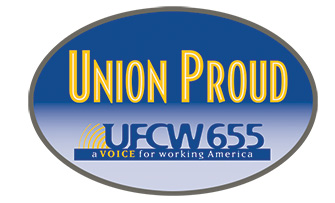Bargaining Begins
 By DAVID A. COOK
By DAVID A. COOK
President
 2021 will be over before we know it and that means that much of this union’s time and resources are about to be focused on bargaining. Contracts for our two largest employers, Schnucks and Dierbergs, are expiring in 2022. This contract will be complex and will pose unique challenges that I’ll discuss in a moment, but for some of you that are aware you may already notice a difference between this bargaining cycle and the last few: we’re starting much earlier.
2021 will be over before we know it and that means that much of this union’s time and resources are about to be focused on bargaining. Contracts for our two largest employers, Schnucks and Dierbergs, are expiring in 2022. This contract will be complex and will pose unique challenges that I’ll discuss in a moment, but for some of you that are aware you may already notice a difference between this bargaining cycle and the last few: we’re starting much earlier.
OPEN CONTRACT MEETINGS
For those of you that don’t know, we’re holding opening contract meetings for our Schnucks and Dierbergs partners at 7 p.m. on three consecutive nights: Nov. 30 – Dec. 2, as well as a 9 a.m. meeting on Dec. 2 to accommodate folks who will be unavailable in the evenings.
These meetings will be the same as last cycle not in person but in Tell-town conference calls to allow more partners to participate. Holding opening contract meetings prior to the end of the year isn’t something we’ve done before, but we will be doing it this year for two main reasons:
- First, our employers as well as you, our partners, have expressed a clear desire to finish bargaining earlier than we have in the past, when we’ve often found ourselves working into the summer and fall to complete contracts.
- Second, because this contract is going to be unique and we are bargaining under circumstances none of us have ever faced. It’s important to start early.
NEW CONDITIONS WILL IMPACT BARGAINING
I’ve been in this union for a long time, and I’ve been involved in bargaining our major contracts for about three decades, and I’ve never seen a contract negotiated under the conditions that we’ll be facing this time around. Some of these are things you already know, some you may not:
- In many ways we’re still battling a pandemic, and while COVID cases and hospitalizations are thankfully beginning to drop after a spike earlier this year, the conditions that COVID created are still lingering and must be addressed. Many of those conditions are outside of our control. As many of you know, the federal government is preparing to roll out mandates for workers to either get vaccinated or receive weekly testing in order to continue working. Regardless of how you feel about those mandates, any federal workplace rule would supersede our union contract, so we’ll be keeping a careful eye on how those rules are written and implemented.
- Masks, social distancing, plexiglass barriers, and numerous other COVID-related precautions can also be subject to federal, state, or local laws, which means we are constantly working with our employers to adjust accordingly.
FRONTLINE WORKERS BEARING THE BRUNT
Some of the conditions created by COVID are being felt much more by our partners than others. You may have heard about some of this in the news. In some places it’s being called a “labor shortage” and some are calling it the “great resignation.” Millions of workers, many of them in retail, have left their jobs. Many workers are also declining to take jobs like yours for any number of reasons.
Safety is certainly a factor, and stress is another. Many of our partners like you have had to work under the most stressful conditions you’ve ever encountered. Not only did you work while many people got to remain safely at home, but you also had to deal with a public that could be rude, agitated, or carrying a contagious disease. You were deemed frontline workers, even hailed as “heroes” all the while working longer than ever, dealing with increasingly irate customers, and with fewer and fewer coworkers to carry the load.
IS IT ANY SURPRISE?
Facing these conditions, is it any surprise that there is a shortage of workers across our major grocery employers? For the past few years it has felt as though there was momentum building behind workers as I’ve said in the past. COVID accelerated that momentum and in October alone we saw a series of strikes and strike votes that were unprecedented. IATSE workers authorized a strike for the first time in their history, nearly 10,000 John Deere workers voted to strike by 99 percent due to healthcare costs, and 1,500 Kellogg workers are still on strike as of this writing due to their inhumane working conditions.
This pandemic pushed workers to realize how valuable their labor is, and that they should be able to demand better pay and conditions for providing it. After all, workers like you were called “essential.”
ESSENTIAL WORKERS SHOULD BE PAID AS SUCH
Well, if you’re essential, then you should be paid like it.
Since the beginning of the pandemic many of our employers, Schnucks and Dierbergs included, have been forced to raise their starting wages to attract more workers, and they are still behind in their goals. While I am thrilled to see workers earning more, this increase has caused some wage compression, leaving long-term workers — the ones that worked with less help during a pandemic, working harder and longer than ever before and who have given years to their company — understandably frustrated that their wages did not rise as well.
I want to be clear: both of these issues can and will be addressed in bargaining. Yes, we need higher starting wages to bring in more workers so that longer-term folks aren’t being pushed to the brink and are constantly understaffed. However, we must also address our long-term partners and the top wages, moving those wages up to reflect the incredible work you are doing.
Those are two critical issues, and I would urge my partners, whether you’re a new hire or a long-term partner to remember that we cannot allow ourselves to be divided at a time like this. We have to commit to getting more wages for ALL workers and not fight amongst ourselves. This union represents all of you, and we will do everything we can to secure fair wages for all of you.
UNPRECEDENTED LABOR MARKET CONDITIONS
So we have wage issues caused by a pandemic and unprecedented labor market conditions and an unpredictable public health crisis, and that’s just one piece of bargaining! We also have to continue to ensure that our partners enjoy some of the best healthcare benefits in their industry, secure appropriate time off, both paid and unpaid, so that you can spend time with your families, make sure workplace rules are fair, logical, and appropriate and take the necessary steps to preserve your pension benefits so that all our partners can retire with dignity.
In other words: there’s a whole lot to do in the most unpredictable time we’ve ever bargained under unique conditions.
THAT’S WHY WE’RE STARTING EARLY
That’s why we are starting early. That’s why we need to hear from ALL of our Schnucks and Dierbergs partners during our opening contract meetings. That’s why you must be engaged in this process. For the last two years we have heard you loud and clear: things need to change. Well, this is the time to change them for the better.
This is a special moment and with hard work, focus and engagement we will be able to secure a contract with significant improvements that are good for all of us.
I will commit right now to doing everything in my power to get you the contract you deserve. I am urging you to commit to engaging in the process with me and getting your co-workers to engage also. Together, we can do some great things.
Let’s get started.


3 Comments
Although Joe Biden has stated that all employees of companies of 100 workers or more must be vaccinated, the governor of Missouri, Mike Parson, has stated there will be no vaccine mandates in the state of Missouri. States supersede the federal level. States rights… the 18th amendment.
I think we should get some kind of bonus without being taxed. We should get sick pay if we get covid from a customer not wearing their mask and cough.
The raises need to be dollars not cents and don’t forget some groups of employees like last time. I was one of those group of employees that got not raise at all last contact.